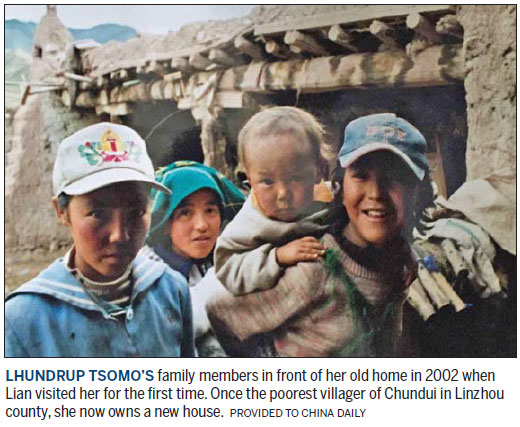Tourism holds key to development
China Daily, September 30, 2016 Adjust font size:

Tibetans 'want to preserve the roots of their tradition but also want to move on and have better lives'
Lian Xiangmin insists acceptance of poverty should not be the price for preserving traditional culture in Tibet.
The director of the Institute of Contemporary Tibetan Studies says many of its farmers make a subsistence living despite the autonomous region being one of China's fastest growing areas.
Some 700,000 people live in absolute poverty with an income of less than 2,300 yuan ($345; 307 euros) a year.
"Most of those who are impoverished are farmers and herdsmen. There is a huge disparity between those who live in urban and rural areas. They've got no problem with food but they don't have any money," he says.
"Many of the people don't look poor. They often live in decent houses. They also have access to healthcare and education because it is free in Tibet. They just lack any cash."
Lian, 53, was speaking in his office in the China Tibetology Research Center in Beijing, China's leading institution for the study of the autonomous region.
He says one of the problems with the debate about Tibet's development is that it is always couched as a clash between preserving its culture and modernization.
"I do not think that is right to set modernity and development in complete opposition to preserving tradition. Although Tibetan residents still mostly live a traditional farming life, they still absorb some external culture and accept some modern ways of living," he says.
"I think most Tibetan people see it that way also. They want to preserve the roots of their tradition but they also want to move on and have better lives."
Lian says one of the problems with the debate about Tibet is that the real situation is not always fairly presented.
"I think people are misled by a lot of misreporting in the Western media. Some reporters have never ever been to Tibet.
"They hold the view that the exiled Dalai Lama represents Tibet but he hasn't been there for nearly 60 years. I believe that only the people who really live there should have a say about their life and their choices."
Lian was a participant in the recent Forum on the Development of Tibet held in Lhasa, which attracted representatives of the media, academia and think tanks from more than 30 countries.
"I think it was a quite important exercise. Attendees had first hand experience of Lhasa so they can see for themselves the real situation in Tibet. When the attendees go back to their home countries they can relay what they have seen and experienced."
Lian says development in the autonomous region is often a more subtle process than many people imagine.
He recounts the story of an elderly woman called Lhundrup Tsomo from Chundui, a village in Linzhou county, who he first encountered in 2002.
She was an impoverished farmer but her fortunes were transformed not by some external modernization strategy but by the fact her daughter married someone who had spent some time outside of the village.
"It wasn't that far away either but she had picked up some knowledge of a modern way of living. When I first met the lady, whenever she had money she would spend it. She didn't know how to manage money and invest it in the farm.